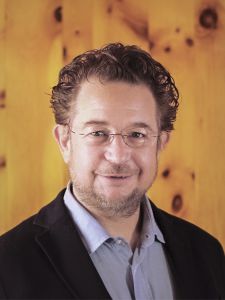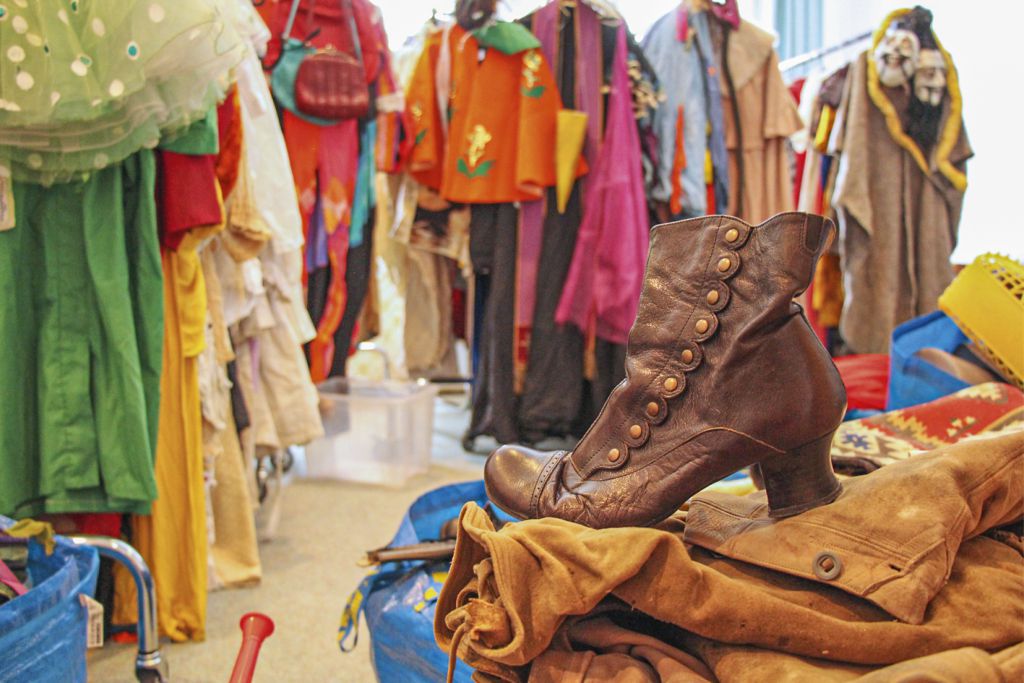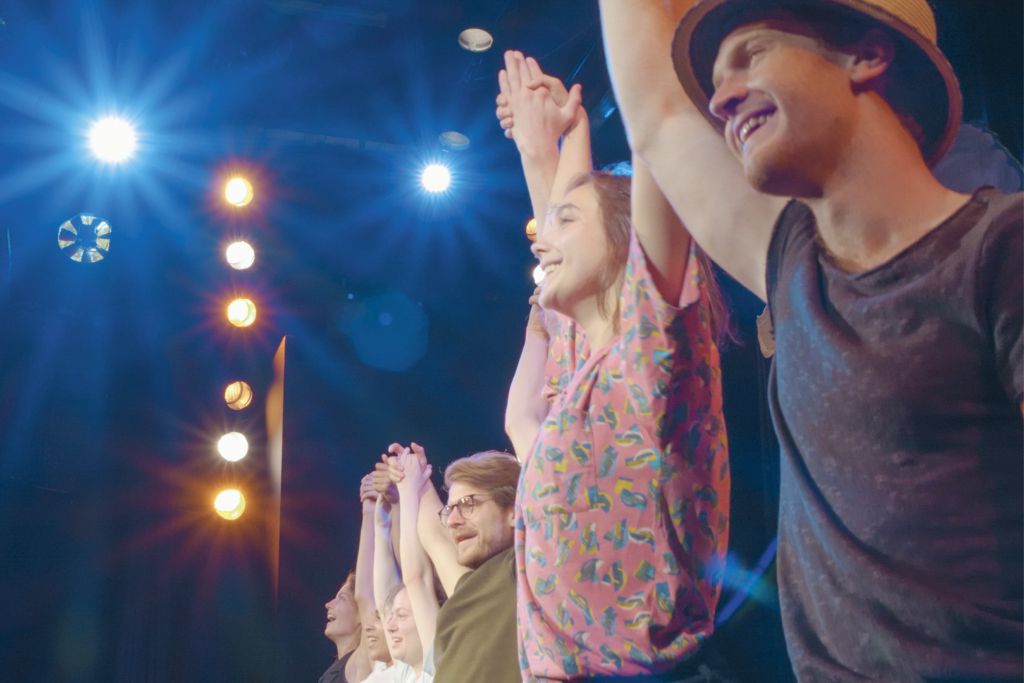It all began with founding the ensemble Theater Brauhaus in Litschau, which gave students the chance to perform theatrically during the Max Reinhardt Seminar’s summer break. Since then, the northern part of the Waldviertel region has become known for its “Theaterfestival HIN & WEG” and even features its own “theatre village”. The initiator and artistic director of these projects is Zeno Stanek, who holds a directing diploma from the Max Reinhardt Seminar and is a true all-rounder in the theatrical universe.

The lion’s share of Zeno Stanek’s family on his mother’s side has been involved in theatre as far back as his great-grandfather, an actor who worked in numerous capacities. “I grew up with theatre, and though my father went into law and my mother became a doctor, the family’s penchant for theatre is something I apparently did inherit.”
Stanek began his university-level education in 1990, at first enrolling in law, theatre studies, and German language and literature. As his academic career progressed, however, he became passionate about a further aspect of the performing arts. “I was going to the theatre very often during this phase, seeing some productions over and over and ultimately falling in love with the idea of crafting the productions themselves.”
I have a need to do, to shape things. That’s why I became a director.
1992 then saw him admitted to the Max Reinhardt Seminar, the mdw’s Department of Drama. And even if the Vienna native Stanek did feel somehow at home at the Max Reinhardt Seminar, actually enrolling there changed his life from the ground up. “It was like entering a monastic order—which is something Max Reinhardt himself once said; we were at the Seminar all day long, and we spent more than a few nights together, as well,” recalls this versatile theatre pro. He describes his experiences at the Max Reinhardt Seminar as life-changing, fascinating, and instructive. From one moment to the next, everything was suddenly about theatre: “This new situation was like entering another world, but it was also family-like and friendly.”
Embedded in this creative and amicable environment, Zeno Stanek teamed up with fellow students from various acting schools to found Theater Brauhaus, a summer theatre in the northern Waldviertel. And even now, years later, he’s remained loyal to that area near the Herrensee where he started—first with the project “Herrenseetheater Litschau”, after which he founded the “Schrammel.Klang.Festival”, which is celebrating its 15th season this year. And in 2018, he went on to transfer the successful concept of “Schrammelklang” to the world of theatre, founding the abovementioned Theaterfestival HIN&WEG. “We take works originally written for the theatrical stage and develop productions in various formats, from staged readings to large-scale theatrical undertakings. And we also seek out new locations that require minimal scenery but deliver maximum emotional value.”
If COVID-19 did anything good for art, it was creating an awareness that we need art.
When COVID-19 came along, this dedicated impresario found himself up against huge challenges. “My initial reaction to the pandemic was that we’d definitely still perform. For the audience, enjoying art is a basic need—and it was also important to show solidarity towards the artists by giving them a feeling of relevance.” Thanks to the summer months’ warm temperatures and the area’s large open spaces surrounded by nature, the festival ultimately was able to go forward. “We spread out the Schrammel.Klang.Festival over five weekends instead of one, and we did, of course, have lower attendance overall,” Stanek recalls. “It ended up being a huge effort, but we did learn a lot for the future.” This year’s festival theme, “Courage and Ephemerality” (Mut und Vergänglichkeit), is especially close to the artistic director’s heart. “We need the courage to perceive and take advantage of the changes that our times bring with them, and we also need to enjoy ephemeral moments.” It’s precisely this kind of courage that Stanek has demonstrated in his latest project: the takeover of Hoteldorf Königsleitn, a holiday resort that had run into in serious financial trouble. With its renovation and re-purposing, the stage director seeks to render theatre more transparent and develop new concepts and approaches via which to introduce young people to theatre. “The important thing to me is that people experience what theatre means and how it has to do with esteem and respect. We want to make theatre something that everybody’s able to experience. And we also want to make it actually possible to immerse oneself in another world.”

Alongside conventional holiday offerings, Stanek’s newly conceived “theatre and holiday village” offers a wide range of theatre-related courses for all age groups. Project weeks as well as holiday camps for school students with renowned teachers and professional artists make for a pressure-free theatrical experience that allows creativity to flourish. And Stanek would also like to appeal to the business world: “School students aren’t the only ones who can derive benefit from theatre’s tools. Our corporate seminars provide insights into the theatrical arts’ creative possibilities, which in turn provide impulses for everyday life. Among the things we convey here are an assured presence, proper breathing, and public speaking skills as well as courage and confidence.”
The variously sized seminar spaces at the Theatre Village are intended for more than just courses and workshops, however; they also offer theatrical ensembles space for rehearsals and other work. “We have the spatial and technical resources to accommodate not only large theatrical ensembles but also film teams. And we want to do a lot of cooperating with acting schools.”
The vision I have is for drama to someday become a compulsory school subject just like music or drawing.
The Theatre Village is conceived as a place of encounter—a place where professional artists, the interested public, school students, and many more can learn from one another. “Young people will benefit from the experience of their elders just like they do at our summer theatre festival—and at the same time, young people radiate unbounded energy and joy in a way that’s truly infectious.”

At the heart of the Theatre Village are the former indoor tennis courts, which are currently being converted into a rehearsal and event centre called “Moment”. Four separable modular spaces, a costume workshop, a photo studio with green screen, and an “Attic of the Imagination” for costumes and stage props will be available to village guests beginning in early 2022.
“The Theatre Village is my attempt to make an educational contribution to theatre, one that will add value that goes beyond mere entertainment. A vision I have is for drama to someday become a compulsory school subject just like music or drawing. And I hope very much that the greatest possible number of people will find the courage to try out what we have to offer.”

